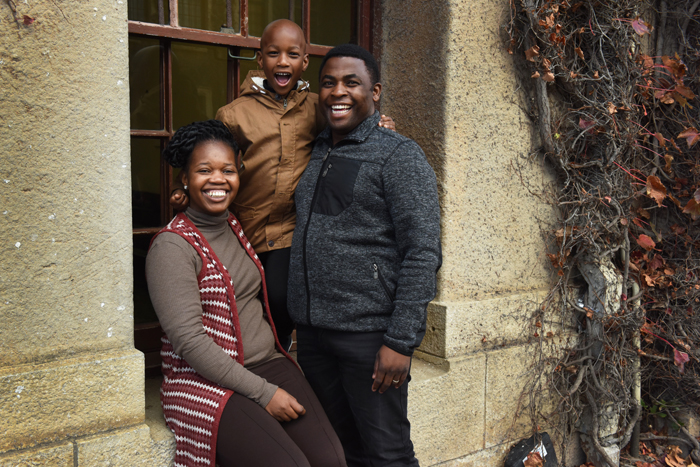The long walk from Limpopo

They say it takes a village to raise a child.
In the case of Fulufhelo Masithulela (or Fulu for short), that proverbial village extends from a teacher in his home village who lent him study guides to get through matric, to a deputy dean who helped him with a late enrolment at the University of the Witwatersrand.

Fulufhelo Masithulela with his wife, Muthumuni, and his six-year-old son, Mukhethwa.
Fulu grew up in the care of his late grandparents in Phadzima Dzumbathoho, a remote village in Limpopo. Money was tight, he recalls, and sometimes he even found himself having to “study by moonlight” due to a lack of paraffin.
“Yes, that’s how bad it used to be,” he observes.
In his village, Joseph Mulaudzi, a biology teacher from a neighbouring school, noticed Fulu studying over weekends and offered to help him out with study materials. The teachers at his own school, Humbelani Secondary School, were also supportive, offering guidance and encouragement, as did his neighbours David Mandiwana and his wife Mmea Makhadzi.
“There are many people who contributed to my upbringing and success,” he says.
The road to Wits
From here, the helping hands continued. At a Thohoyandou shopping centre, he ran into his brother, the late Tshililo Khavhatondwi, who handed over a cheque from a customer in his trucking business, which allowed him to register and complete his first year BSc at the University of Venda (Univen). Another brother, Nkhumeleni Khavhatondwi, also contributed towards the registration fee at Univen.
Fulu’s true ambition was to study engineering, and so when he arrived in class for his second year at Univen, a lecturer said to him, “Why are you still here this year?” His answer was that he had no money for transport to go to Wits, and so the lecturer handed him the money.
He arrived in Johannesburg in late January 2001, only to be told that admissions had already closed and classes had started. Undeterred, he approached the dean’s office to say, “I really want to do this. Please give me the opportunity.”
Then deputy dean Professor Raymond Nkado (later to become the first black dean of Engineering and the Built Environment at Wits) asked to see Fulu’s results. He then took him by the hand to admissions where he said, “Let’s register this young man.”
But Fulu still faced an uphill battle – with nowhere to sleep, he recalls having to bed down in one of the classrooms for six months before finding a place in residence. Initially he enrolled for chemical engineering but switched to mechanical engineering, which he completed with a bursary from Transnet Freight Rail (formerly known as Spoornet). After completing his undergraduate degree, he worked part-time on his master’s while working for Transnet Freight Rail. Mechanical engineering, in due course, was to lead to biomedical engineering – and the path to his PhD.
“Even during my stay at Wits, especially that first year, it was never easy. Thanks to my brother Thabelo, who motivated me and always kept a positive spirit,” he observes of yet another helping hand in his quest. And he notes that Wits vice-chancellor Loyiso Nongxa and Professor Thandwa Zizwe Mthembu, from the Central University of Technology, were both instrumental in encouraging him to pursue his PhD studies.
“If it weren’t for them, I would not have resigned from my former full-time employment to study full-time at UCT.”
Matters of the heart
Fulu’s thesis focuses on the study of impaired cardiac mechanics and function after a myocardial infarction (the medical name for a heart attack). Heart attacks are a leading cause of death worldwide and the only treatment for heart failure is a transplant. To develop new therapies, it is important to understand the structural and functional changes in the heart after an attack, which is where Fulu’s research comes into play.
It’s an area of engineering that crosses the divide between the mechanical and the biological – and speaks to Fulu’s early ambition.
“I was inspired by my aunt, father and mother, who insisted in the value of education. My father, who is very handy in nature and would design and build various objects, has also inspired me to become an engineer,” he says.
It is a testimony to the lost opportunities of this country that Fulu’s father never went to school but taught himself to read and write.
A sad postscript to this story is that, while working towards his PhD at UCT, Fulu lost his six-month-old daughter, Muneiwa, to a rare congenital heart condition.
“This was an extremely difficult time,” he reflects. But with the help of his wife Muthumuni, a medical doctor and UCT graduate, and his now six-year-old son, Mukhethwa, he persevered. Both will be at the graduation ceremony to celebrate his success.
Future work
After two years in Cape Town, however, financial pressures required him to return to full-time employment, this time as a senior lecturer at the University of South Africa (Unisa).
He has been instrumental in setting up a biomechanics laboratory at their science campus in Florida, Gauteng. Unique in Africa, this multi-million rand laboratory is able to use mechanical engineering tools to test biological materials, such as soft tissue, hair, teeth and bones.
No wonder then that Associate Professor Thomas Franz (in the division of biomedical engineering) penned the following words for Fulu’s citation:
“His perserverance and achievements certainly serve as an example for overcoming challenges. There is no doubt that Fulufhelo will continue to excel in his further academic and professional career and act as a role model that South Africa needs on its way to transformation and equity.”
Story Andrea Weiss. Photo Michael Hammond.